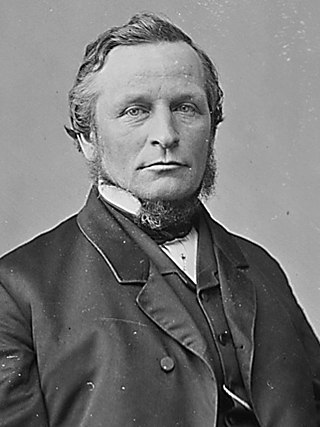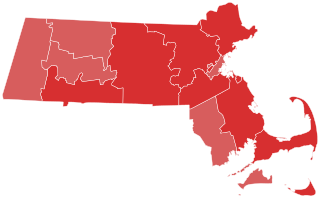
William Boyd Allison was an American politician. An early leader of the Iowa Republican Party, he represented northeastern Iowa in the United States House of Representatives before representing his state in the United States Senate. By the 1890s, Allison had become one of the "big four" key Republicans who largely controlled the Senate, along with Orville H. Platt of Connecticut, John Coit Spooner of Wisconsin and Nelson W. Aldrich of Rhode Island.

The 1992 United States House of Representatives elections were held on November 3, 1992, to elect U.S. Representatives to serve in the 103rd United States Congress. They coincided with the 1992 presidential election, in which Democrat Bill Clinton was elected president, defeating Republican incumbent President George H. W. Bush.

The 1982 United States House of Representatives elections was an election for the United States House of Representatives held on November 2, 1982, to elect members to serve in the 98th United States Congress. They occurred in the middle of President Ronald Reagan's first term, whose popularity was sinking due to economic conditions under the 1982 recession. The President's Republican Party lost seats in the House, which could be viewed as a response to the President's approval at the time. Unlike most midterm election cycles, the number of seats lost—26 seats to the Democratic Party—was a comparatively large swap. It included most of the seats that had been gained the previous election, cementing the Democratic majority. Coincidentally, the number of seats the Democrats picked up (26), was the exact amount the Republicans would have needed to win the House majority. It was the first election held after the 1980 United States redistricting cycle.

William Barrett Washburn was an American businessman and politician from Massachusetts. Washburn served several terms in the United States House of Representatives (1863–71) and as the 28th governor of Massachusetts from 1872 to 1874, when he won election to the United States Senate in a special election to succeed the recently deceased Charles Sumner. A moderate Republican, Washburn only partially supported the Radical Republican agenda during the American Civil War and the Reconstruction Era that followed.

The 1994 Massachusetts gubernatorial election was held on November 8, 1994. Incumbent Republican governor Bill Weld won reelection as Governor of Massachusetts by the largest margin in state history, winning every single county and all but 6 of the state's 351 municipalities. As of 2024, this is the most recent election in which Boston, Somerville, Lawrence, Chelsea, Brookline, Northampton, Provincetown, Monterey, Great Barrington, Ashfield, Williamstown, Williamsburg, Shelburne, Sunderland, and Pelham voted for the Republican candidate for governor.
The Massachusetts Republican Party (MassGOP) is the Massachusetts branch of the U.S. Republican Party.

The 1900 New York state election was held on November 6, 1900, to elect the governor, the lieutenant governor, the Secretary of State, the state comptroller, the attorney general, the state treasurer and the state engineer, as well as all members of the New York State Assembly and the New York State Senate.

The 1928 United States Senate election in Massachusetts was held on November 6, 1928, with Democratic incumbent David I. Walsh defeating his challengers.

The 1876 Massachusetts gubernatorial election was held on November 7. Incumbent Republican governor Alexander H. Rice was re-elected to a second term in office over former Minister to Great Britain Charles F. Adams.

The 1877 Massachusetts gubernatorial election was held on November 6. Incumbent Republican governor Alexander H. Rice was re-elected to a third term in office over former governor William Gaston.

The 1878 Massachusetts gubernatorial election was held on November 5. Former acting Governor Thomas Talbot, a Republican, defeated Benjamin Butler, who ran as an independent Greenback candidate with Democratic support. Butler's supporters secured a majority of delegates to the Democratic state convention, but his nomination was rejected by the state party committee after his supporters used violent tactics to exclude anti-Butler delegates from the convention hall.

The 1906 Wyoming gubernatorial election was held on November 6, 1906. Incumbent Republican Governor Bryant B. Brooks ran for re-election to a second term. After winning renomination against some intraparty challengers, he faced State Senator Stephen Keister in the general election. Brooks was ultimately able to win re-election by an overwhelming margin, setting a record for the largest majority in a state gubernatorial election, which would not be exceeded until Governor Stanley Hathaway's re-election in 1970.

The 1859 Massachusetts gubernatorial elections was held on November 2. Incumbent Republican governor Nathaniel Banks was easily re-elected to a third term in office in a race featuring three governors of Massachusetts: incumbent governor Banks, former governor George Nixon Briggs (1844–51), and future governor Benjamin Franklin Butler (1882–83).

The 1860 Massachusetts gubernatorial election was held on November 6. Incumbent Republican governor Nathaniel Banks did not run for re-election to a fourth term. He was succeeded by Republican John Albion Andrew, a radical abolitionist.

The 1884 Massachusetts gubernatorial election was held on November 4. Incumbent Republican governor George D. Robinson was re-elected to a second term in office over Democrat William Crowninshield Endicott.

The 1874 Massachusetts gubernatorial election was held on November 3, 1874. Republican acting Governor Thomas Talbot, who took office after the resignation of William B. Washburn, was defeated by Democrat William Gaston, a former Mayor of Boston.

The 1873 Massachusetts gubernatorial election was held on November 4, 1873. Republican Governor William B. Washburn was re-elected to a third term in office over Democrat William Gaston.

The 1871 Massachusetts gubernatorial election was held on November 7, 1871. Incumbent Republican Governor William Claflin did not run for a fourth term in office. He was succeeded by Republican U.S. Representative William B. Washburn, who defeated Democrat John Quincy Adams II.

The 1868 Massachusetts gubernatorial election was held on November 3.

The 1823 New Hampshire gubernatorial election was held on March 11, 1823.






















